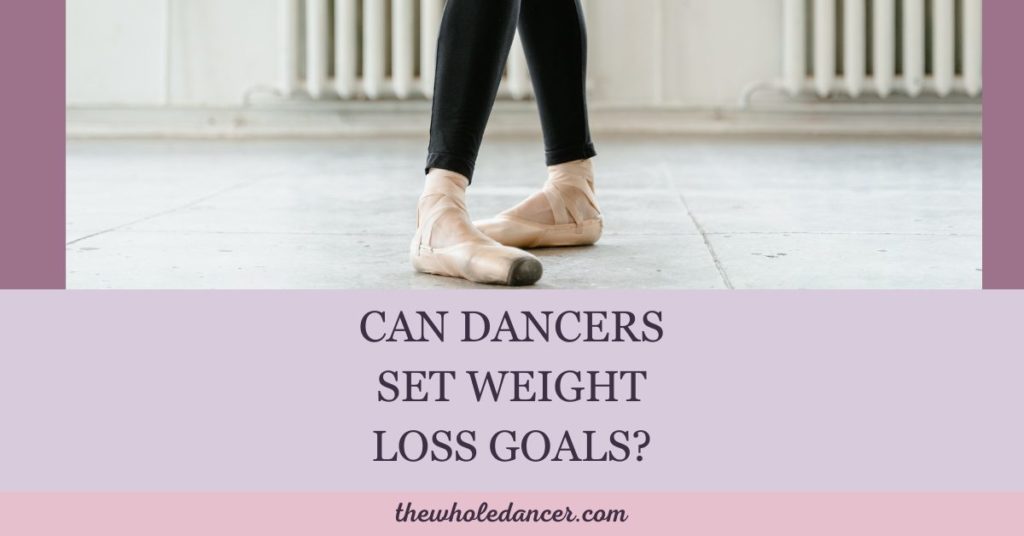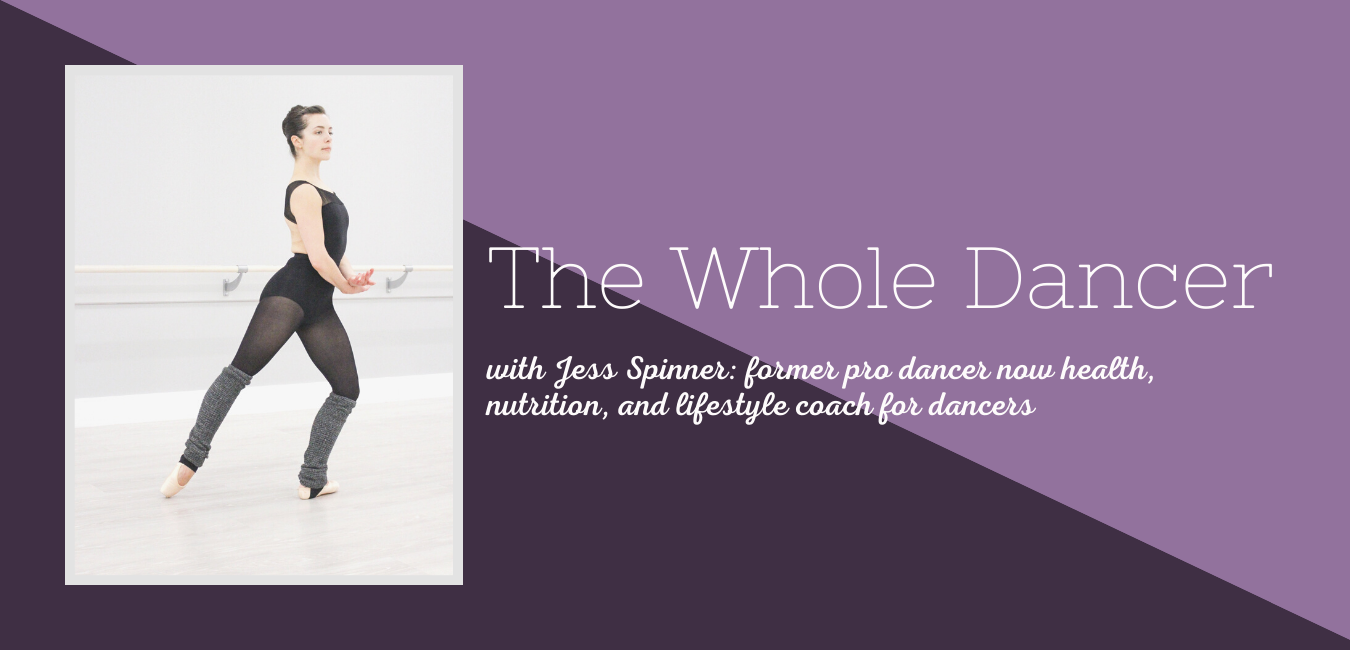I’ve covered weight loss for dancers in various capacities over the years, but I’ve never addressed it so directly. Honestly, I think by avoiding the topic, I’ve done you a disservice. This topic needs to be addressed because lots of body pressure still exists in the dance industry. It is very real for professionals, and unfortunately it’s even a part of the young dancer experience.
Many people don’t actually talk about this, which leads dancers to search through non-dancer resources, often finding misinformation or incredibly unhealthy advice. In an effort to be “healthy,” dancers get restrictive. Or they’re told their muscles are “bulky,” so they aim for a calorie deficit.
So, let’s dive into this very loaded topic.

Can dancers set weight loss goals?
If you’re under 18…
Here’s where there’s a hard stop. If you’re under 18, pre-pubescent, or possibly still growing, you should absolutely not be trying to lose weight.
Children and adolescents are going through physical changes all the time. Their hormones are adjusting and working towards a new balance. Any weight loss aims can very easily disrupt these changes and upend the delicate balance.
Beyond that, trying to lose weight will damage your relationship with food. This damage can result in eating disorders, restrictive eating, and ongoing food challenges that can last for years (or decades).
My own food struggles started at age 14 when I decided I needed to lose weight so I started my first diet. For me, this resulted in disordered eating habits, negative self-image, and fluctuating weight that lasted for over a decade. It made my entire dance journey, from student through professional, about my body. I was never able to fully focus on the dancing, technical improvement, or opportunities I was given.
If you’re struggling to accept your weight or self-image, work on your food relationship and boost your body image to move through those challenges. I work with dancers as young as 15 (14 in rare cases), so if this is you, it might be time to talk with a parent and have them reach out for support.
Can dancers set weight loss goals as an adult or professional?
You should have bodily autonomy. This means you are in charge of and have agency over your body, what happens to it, and how you want it to look. For dancers, there’s an added layer in that your body is being judged and observed daily. That fact makes this question a bit more complicated.
If you’re someone who has a history of eating disorders or disordered eating, you’ve likely got to go through many years of healing before you can make any goals around changing your body.
For some, it is possible to desire to look differently and for it to come from a healthy place. For example, if you’ve had some time off, perhaps you’d like to regain your muscle tone. Maybe your body has changed, you have gained weight, and you’d like to make adjustments to get back to where you were.
Before you go down that road, consider these 5 Questions to Ask Yourself if You Want to Change Your Body for Dance.
Ultimately, you may decide, “Yes, I want to make some changes to alter my physical appearance.” Here’s how to go about that with a balanced perspective…
It should actually never be about the weight.
If you desire to work towards physical changes, don’t make it about a number. Weight looks different on each of us. The weight that feels good for you and that you feel looks good on you may be very different from some arbitrary number you’ve deemed acceptable or desired.
For dancers, a scale isn’t a helpful tool. I would argue that this is also true for most people, except perhaps those who lose weight easily and are trying to avoid an unhealthily low body weight.
Nevertheless, any desire to change your body shouldn’t be motivated by what you see on the scale. That number is too changeable. So many things factor into what shows up on the scale, from hormones to water weight to time of day. Furthermore, the scale isn’t a reflection of how you look, how you dance, or your potential to improve and grow as a dancer.
Need more convincing? Here are 7 Reasons to Ditch Your Scale.
Instead of basing your body goals on a number on the scale, set goals based on how you want to feel. When you put the focus on how you want to feel in your body, your physical shape can shift without much effort.
If you’re fixated on the scale or losing weight specifically, take a major pause. What are you tying weight loss to? Do you think losing weight means instant success? Better roles? A promotion or paid job? Odds are, you’re valuing the weight or smaller body over your dance technique or artistry.
What happens when you set goals based on how you want to feel in your body.
If you’re focused on feeling energized, happy, and strong, you’re going to take action aligned with that end. Rather than getting stuck in restriction, which is what happens 9 times out of 10 when weight loss is the goal, you’ll be able to focus on the foods that actually feel good for you to eat.
When you go to the gym or practice your cross-training routine, that effort will be coming from a place of self-love and growth instead of a place of punishment.
Body-feeling goals are about tuning into what feels good, tastes good, and works for your personal needs and preferences. Whereas, weight-focused goals set you up to ignore your body’s cues. You’ll eat the “right” foods and become disconnected from your desires, preferences, and personal needs.
Setting yourself up to achieve your personal best body.
You cannot maintain a balanced, healthy, supportive approach if lowering the number on the scale is your primary or only goal.
That’s a bold statement, I realize that. However, it comes from years of experience in my own dieting cycles, years of experience working with dancers, and years of study and research on topics of dieting, nutrition, lifestyle, dancers, and well-being.
If you desire body change but don’t want to get caught up in an unhealthy approach, reach out and schedule your complimentary coaching consultation call.
Some examples of body-feeling change for 1:1 Elite Best Body Coaching Clients:
I feel like I am in less of a “fog.” I have built good habits for myself surrounding food choices and have also built a lot of confidence in the studio. Now, I listen to my body more now when it is asking for a break and prioritize self care.
Colleen Underriner, Steps on Broadway Conservatory
Now, I am much more confident about my body and I am more conscious in my everyday life. I understand that every body is different and I don’t have to compare my body to other dancers’ bodies which gives me freedom finally.
Bettina Jurák, GöteborgsOperans Danskompani
I feel confident in my dancing and am able to also separate myself from negativity that others feel and not let it affect me. I am not stuck in the binge/restrict cycle any longer and I can enjoy a life full of food, love, and dancing!
Maia Blake, Ballet Spartanburg
Since working with Jess, I don’t feel guilty eating anymore, and I have flexibility with what I can eat. I have made much more peace with my body, and I am confident with how I look.
Nicole Dickson, Freelance Dancer in Boston
Some examples of body-feeling change for clients in The Dancers’ Balanced Body Program:
Rather than worrying about weight gain, I get to consider what will help me feel fulfilled today. Some days it’s my favorite salad and other days, it’s a homemade baked treat. Though I’ve had some weight loss, I don’t believe it’s the most important change from the program.
Timmorie Freeman, Freelance Dancer in the SF Bay Area
I have discovered an eating plan that works for me and helps me feel energized and confident. I have noticed positive changes in my body and proportions that have not only been noticed by me but by others as well.
Anna Ackerman, New York State Ballet
I have seen changes in my leg muscles and abdominals. I have much less worry about my body and myself as a whole person. My mindset is much more positive.
Emma Stewart, Canada’s National Ballet School
If you prefer to listen to The Whole Dancer viewpoint on dancer weight loss, listen to the podcast below.
